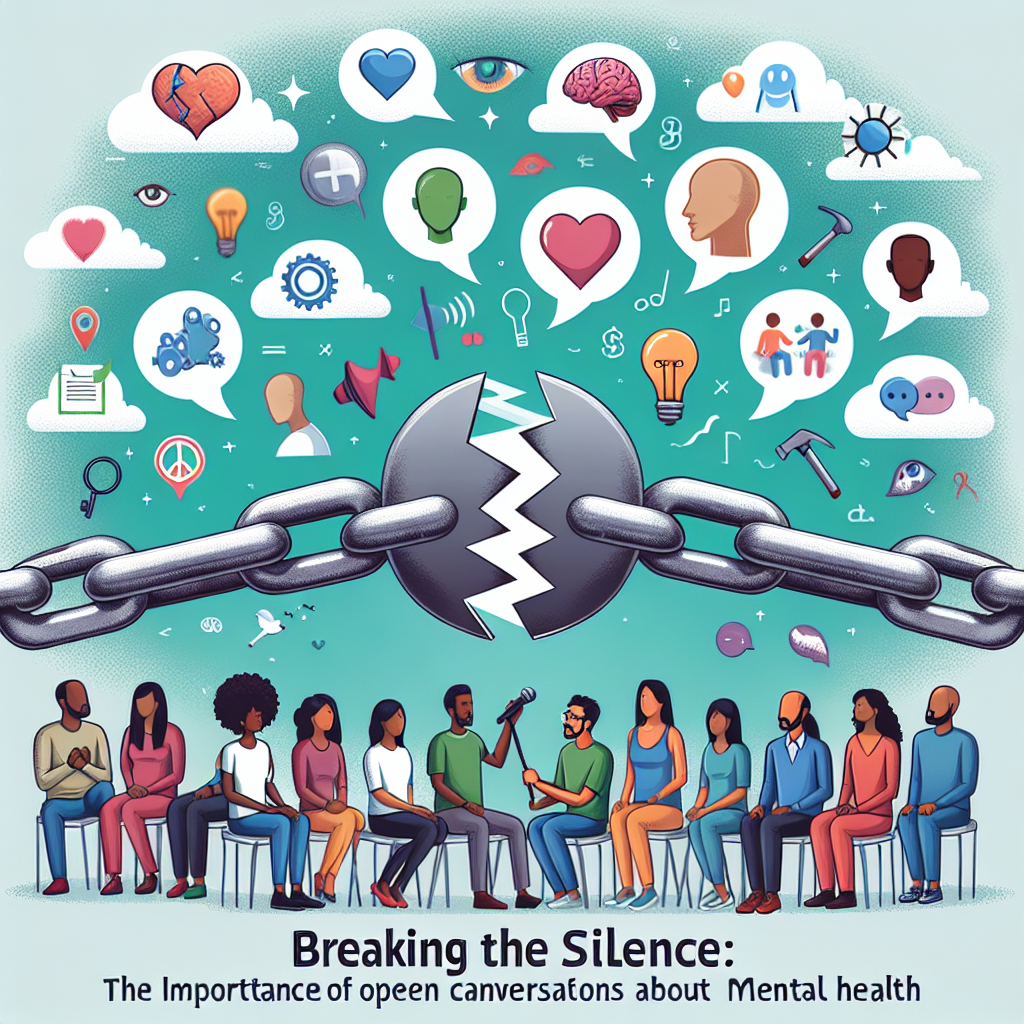
Introduction
In today’s fast-paced world, mental health remains a critical aspect of overall well-being, yet it continues to be wrapped in silence and stigma. It’s time to break the silence: the importance of open conversations about mental health cannot be overstated. A recent survey found that nearly one in five adults in the U.S. experience mental illness annually. However, many still feel isolated due to the stigma associated with these conditions. By fostering an environment where mental health discussions are both accepted and encouraged, we create a society where individuals feel supported and empowered to seek help.
This article will delve into the significance of encouraging open dialogues regarding mental health, sharing real-world applications, case studies, and actionable insights to inspire readers to engage in these essential conversations.
The Weight of Silence: Understanding Mental Health Stigma
The Role of Stigma in Mental Health
Stigma surrounding mental health often leads to silence, which can exacerbate feelings of loneliness and despair. According to the National Alliance on Mental Illness (NAMI), stigma includes negative attitudes and beliefs toward people with mental health conditions. This stigma can prevent individuals from seeking help, leading to worsened conditions and social isolation.
Case Study: The Impact of Stigma on Workplace Mental Health
A study conducted by Deloitte found that 61% of employees who experience mental health issues do not seek help due to perceived stigma in the workplace. This fear of judgement not only causes individual suffering but can also lead to decreased productivity and higher turnover rates. The need for companies to cultivate a supportive environment is paramount.
Analysis
This case study highlights the necessity of breaking the silence around mental health issues in the workplace, as it is not only a personal concern but also a significant organizational issue. Open conversations about mental health can lead to healthier work environments and improve overall employee satisfaction.
Encouraging Open Conversations: A Path Forward
The Power of Open Dialogue
When we speak openly about mental health, we dismantle stigma and empower individuals to share their experiences. Open conversations reduce isolation and validate the feelings of those suffering.
Tips for Starting the Conversation
- Choose the Right Setting: Select a comfortable and private environment.
- Be Empathetic: Listen attentively and validate feelings without judgement.
- Share Personal Experiences: This encourages others to share their stories.
Case Study: A University’s Mental Health Initiative
In 2019, a major university launched a mental health awareness campaign aimed at breaking the silence surrounding student mental health issues. They organized workshops, peer support groups, and social media campaigns. Post-campaign surveys revealed a 30% increase in students seeking mental health resources.
Analysis
This initiative illustrates how proactive measures encourage students to engage in conversations about their mental health. More students feeling empowered to seek help underscores the importance of creating an inclusive environment conducive to open discussions.
The Role of Healthcare Professionals
Training for Better Conversations
Healthcare professionals are at the forefront of addressing mental health issues. Training programs emphasizing the importance of open communication about mental health can enhance the effectiveness of treatment. A culture of transparency in clinics and hospitals ensures patients feel safe discussing their mental struggles.
Case Study: Integrative Healthcare Models
An integrative healthcare model in a New York hospital incorporated mental health screenings into general health check-ups. This model led to a 40% increase in patients discussing their mental health concerns with their primary care doctors.
Analysis
By breaking the silence and integrating mental health discussions into regular healthcare practices, patients were more likely to engage in meaningful conversations about their mental well-being. This model exemplifies how healthcare settings can promote dialogue about mental health.
The Importance of Education and Awareness
Raising Awareness Through Education
Educational initiatives targeting mental health can transcend stigma and foster open conversations. Providing accurate information about mental health conditions can dispel myths and encourage understanding and empathy.
Case Study: Mental Health Education in Schools
A California school district implemented a mental health curriculum in middle and high school classrooms. The initiative aimed at educating students about mental health, coping strategies, and the importance of seeking help. Surveys conducted after the implementation revealed a 50% reduction in reported bullying related to mental health issues.
Analysis
This case study underlines the role of education in breaking the silence surrounding mental health. By teaching children the importance of empathy and understanding mental health, we guide them towards fostering open conversations in their social circles.
Mental Health and Social Media: A Double-Edged Sword
The Role of Social Media in Mental Health Discourse
Social media platforms can serve as valuable tools for breaking the silence surrounding mental health. They offer spaces for individuals to share their experiences and connect with others facing similar challenges. However, they can also exacerbate stigma through negative narratives.
Strategies for Positive Social Media Use
- Promote Healthy Content: Share uplifting stories and strategies for coping.
- Engage in Conversations: Use platforms to discuss mental health openly and vulnerably.
Case Study: #BellLetsTalk Campaign
The #BellLetsTalk campaign in Canada encourages people to talk about mental health, donating money for each tweet or hashtag used. In its first year, the campaign sparked millions of conversations and raised upwards of $7 million for mental health initiatives.
Analysis
This campaign demonstrates the potential of social media to ignite open dialogues about mental health, proving that platforms can be powerful resources for advocacy and support, ultimately breaking the silence on an important issue.
Building a Community of Support
Creating Safe Spaces
Communities play a crucial role in supporting individuals with mental health conditions. Establishing safe spaces where people can share their experiences and feel understood is vital.
Initiatives and Resources
- Support Groups: Local organizations and online forums can provide peer support.
- Community Workshops: Encourage discussions about mental health, resilience, and coping strategies.
Case Study: Recovery Community Centers
Models of recovery community centers across the U.S. promote peer support and open discussions about mental health. These centers have reported significant improvements in the well-being of participants, reducing feelings of isolation and fear.
Analysis
This case study emphasizes the need for community initiatives dedicated to breaking the silence on mental health, showcasing how structured peer support can provide a platform for open conversations and healing.
The Way Forward: Steps to Encourage Open Conversations
1. Start Within Your Circle
Whether at home, work, or school, the best way to initiate conversations is to start small. Encourage friends, family, and colleagues to talk about their mental health openly.
2. Utilize Technology for Good
Leverage apps and platforms that promote mental health conversation and support, such as mindfulness apps or mental health blogs.
3. Encourage Policy Changes
Advocate for policies that prioritize mental health resources in schools and workplaces, ensuring that discussions are normalized and encouraged.
4. Lead by Example
Be transparent about your mental health journey. Share your experiences and demonstrate the importance of seeking help and having conversations.
Conclusion
Breaking the silence surrounding mental health is essential for fostering a society that values and prioritizes mental well-being. By engaging in open conversations, we dismantle stigma, encourage support, and empower individuals to seek help. Remember, each conversation could be the catalyst for someone else’s healing.
When we break the silence: the importance of open conversations about mental health becomes evident not only for individuals directly affected but for society as a whole. We must strive to create environments where mental health discussions are commonplace, ensuring we all have a voice in this crucial dialogue. Let’s commit to breaking the silence together.
FAQs
1. Why is mental health stigma a barrier to treatment?
Mental health stigma creates a fear of judgement, which can prevent individuals from seeking help. When people feel judged or misunderstood, they are less likely to talk about their struggles, leading to isolation.
2. How can I support a friend struggling with mental health issues?
Offer a listening ear without judgement, encourage them to seek professional help, and remind them that it’s okay to talk about their feelings openly.
3. What are effective ways to discuss mental health in a workplace?
Create a culture that normalizes mental health conversations through workshops, support programs, and open-door policies that encourage staff to discuss their mental health needs comfortably.
4. Are there any online resources for mental health support?
Yes, numerous organizations provide online support, including NAMI, MentalHealth.gov, and various mental health apps offering coping strategies and community support.
5. How do I start a conversation about mental health with someone who seems reluctant?
Begin by sharing your own experiences if comfortable, express understanding and empathy, and emphasize that their feelings are valid. Offer assurance that they are not alone and that it’s okay to seek support.
In conclusion, breaking the silence: the importance of open conversations about mental health cannot be overstated. Together, we can change the narrative and build a supportive community that prioritizes mental wellness for everyone.















